
An ethnic group or an ethnicity, is a category of people who identify with each other based on similarities such as common ancestry, language, history, society, culture or nation. Ethnicity is usually an inherited status based on the society in which one lives. Membership of an ethnic group tends to be defined by a shared cultural heritage, ancestry, origin myth, history, homeland, language or dialect, symbolic systems such as religion, mythology and ritual, cuisine, dressing style, art or physical appearance.
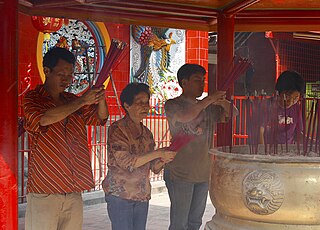
Chinese Indonesians or simply Tionghoa, are Indonesians descended from various Chinese ethnic groups, primarily the Han Chinese. Many people who identify, or are identified, as "Chinese Indonesian" are of mixed Chinese and local ancestry.

Omega Phi Chi Multicultural Sorority, Inc. (ΩΦΧ) is a national multicultural sorority that was established on November 9, 1988 at Rutgers University in New Brunswick, New Jersey by eight women of Asian, African American, and Latina descent.
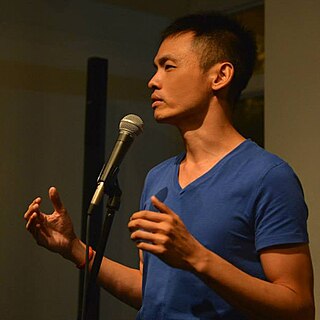
Cyril Wong is a poet, fictionist and critic.
Asian pride is a term utilized internationally but has various origins and meanings.
Primordialism or perennialism is the argument which contends that nations are ancient, natural phenomena.

The Orchid House was a book published in 1953, and the only novel written by Dominican writer Phyllis Shand Allfrey. It is considered "a pioneering work of Caribbean literature". The Orchid House is a fictionalized account of Allfrey's early life, narrated by an old Black nurse Lally from Montserrat. It was turned into a highly acclaimed film for British television.
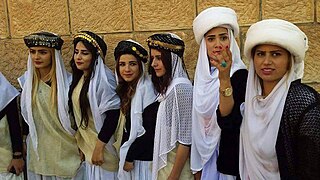
An ethnoreligious group is an ethnic group whose members are also unified by a common religious background.

The culture of Singapore is a combination of Asian and European cultures. Influenced by Malay, South Asian, East Asian, and Eurasian cultures, Singapore has been dubbed as a country where "East meets West", "Easy Asia" and "Garden city".
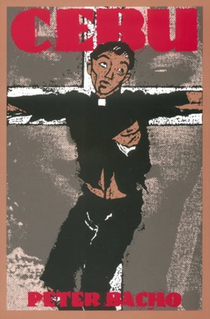
Cebu is a 1991 novel by Filipino American author Peter Bacho the "most visible figure" of second-generation, native-born Filipino American writing and one of several Seattle novelists in the 1990s to explore the racial history and sociology of Seattle. The novel is also "the first novel about a Filipino American who identifies primarily with US localities," rather than with the Philippines.

The ancestral population of modern Asian people has its origins in the two primary prehistoric settlement centers - greater Southwest Asia and from the Mongolian plateau towards Northern China.
A policy of multiculturalism was officially adopted by the Government of Canada under Pierre Trudeau during the 1970s and 1980s. The Canadian federal government has been described as the instigator of multiculturalism as an ideology because of its public emphasis on the social importance of immigration. The 1960s Royal Commission on Bilingualism and Biculturalism is often referred to as the origin of modern political awareness of multiculturalism.
Fixer Chao is a 2002 novel by Chinese American author Han Ong.

State of War, also known as State of War: A Novel, is the first novel written in 1988 by American Book Award recipient and Filipino author Ninotchka Rosca. It was described as a political novel that recreated the diverse culture of the Philippines through the presentation of an allegorical Philippine history.
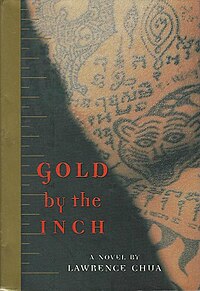
Gold By The Inch is a novel by author Lawrence Chua.
Tjerita "Oeij-se": Jaitoe Satoe Tjerita jang Amat Endah dan Loetjoe, jang Betoel Soedah Kedjadian di Djawa Tengah is a 1903 Malay-language novel by the ethnic Chinese writer Thio Tjin Boen. It details the rise of a Chinese businessman who becomes rich after finding a kite made of paper money in a village, who then uses dishonesty to advance his personal wealth before disowning his daughter after she converts to Islam and marries a Javanese man.
Writing in Asia Series was a series of books of Asian writing published by Heinemann from 1966 to 1996. Initiated and mainly edited by Leon Comber, the series brought attention to various Asian Anglophone writers, like Shirley Geok-lin Lim, Western writers based in Asia like Austin Coates and W. Somerset Maugham and modern and classic stories and novels in English translation from the Malay, Indonesian, Thai and more. The series is also credited with contributing prominently to creative writing and the creation of a shared regional identity amongst English-language writers of Southeast Asia. After publishing more than 110 titles, the series folded after Heinemann Asia was taken over by a parent group of publishers and Comber left.

Suffian Hakim bin Supoano is a Singaporean media professional and author known for his novels, Harris bin Potter and The Stoned Philosopher and The Minorities.
Mohamed Latiff Mohamed is a Singaporean Malay poet and writer.














